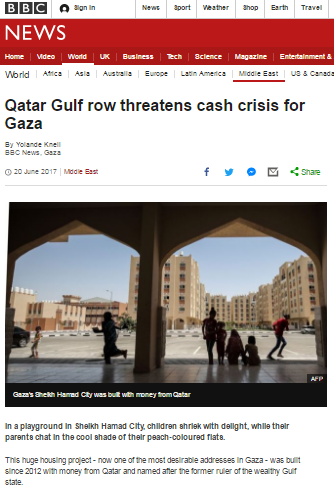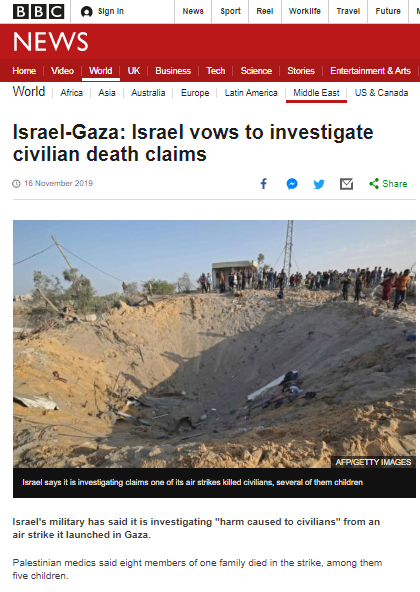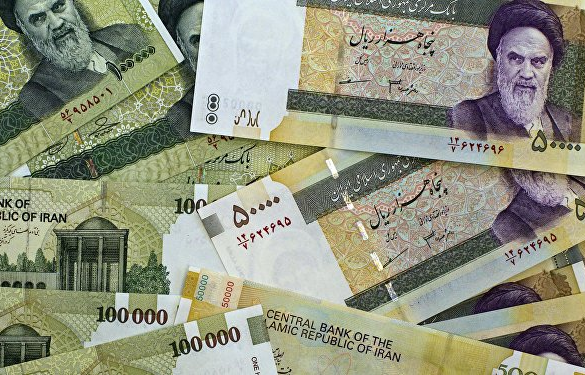BBC News coverage of what it terms the “Europe migrant crisis” has recently involved sending various members of staff to report from different countries including Libya, Jordan, Hungary and Turkey.
The person chosen to provide BBC audiences with the information which would supposedly help them understand the reasons behind the mass movement of people from Syria to Europe was the BBC’s Middle East editor Jeremy Bowen and it is worth taking a look at some of his recent reports from Syria in order to determine whether or not audiences did in fact receive the full range of factual information concerning the situation in the country from which a large proportion of the migrants fled.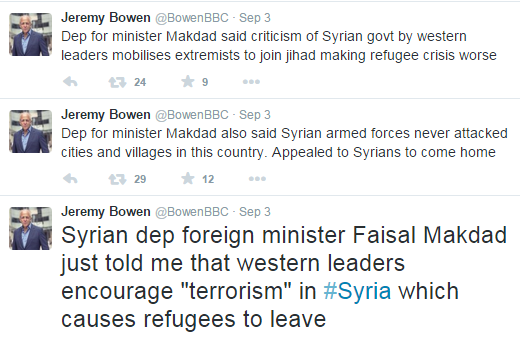
After having arrived in Damascus on September 2nd, Bowen produced a report from a press conference with the Syrian Deputy Foreign Minister in which he failed to present any challenge to Mekdad’s claim that “the Syrian army has never, ever attacked or initiated any attack against a city or against a village”. That and other regime propaganda was further amplified by Bowen on Twitter.
Bowen made two filmed reports for television news programmes, both of which were also promoted on the BBC News website. The September 8th report “Inside a hospital in Syrian leader Assad’s Latakia heartland” was obviously made with the consent and help of the Assad regime and in addition to being allowed to film in a government military hospital, Bowen produced footage from a camp for internally displaced persons in Latakia. At no point in that report were the regime’s attacks on its own population mentioned and viewers received no information concerning the Iranian regime’s patronage of Assad or the participation of Iranian and Hizballah forces in the conflict.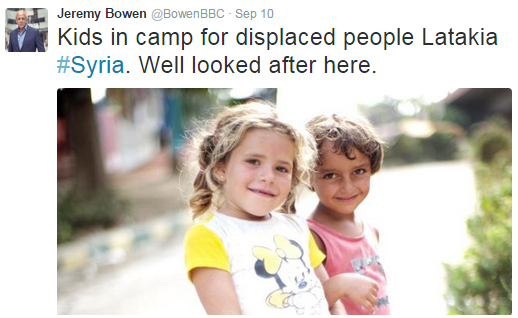
Another September 8th filmed report by Bowen – “Syria: Snapshot of life inside Assad stronghold” – likewise failed to include any information about the role of Iran and its Lebanese proxy in the Syrian civil war. Bowen did however manage to shoehorn another Middle Eastern country into his report by telling viewers that Yarmouk, near Damascus, “was a Palestinian refugee camp for families who were forced out of Israel in another war” [emphasis added]. Bowen’s presentation of the manner in which Palestinians – the majority from Tsfat (Safed), Haifa and Tiberias – arrived in Syria is of course both simplistic and inaccurate.
In that report too viewers saw sympathetic footage from the displaced persons camp and the military hospital in Latakia. It is of course inconceivable that Bowen visited those sites, the regime held part of Yarmouk or the military funeral in an Alawite town which also features in some of his reporting, without considerable cooperation from the Syrian regime. Stating the obvious, Bowen tells viewers that:
“…the refugee crisis is created and driven by war…”
A subsequent brief statement shows that, despite his failure to challenge Faisal Mekdad’s propaganda several days earlier, Bowen is indeed aware of the reality:
“Syrian army attacks often create more refugees and so do attacks by Jihadists.”
However, the BBC’s Middle East editor failed to expand upon that topic in any of his reports and made no effort to inform audiences of the fact that more Syrian civilians have been killed by regime forces than by Jihadists of various stripes whilst scrupulously avoiding all mention of topics such as the use of chemical weapons and barrel bombs by the regime.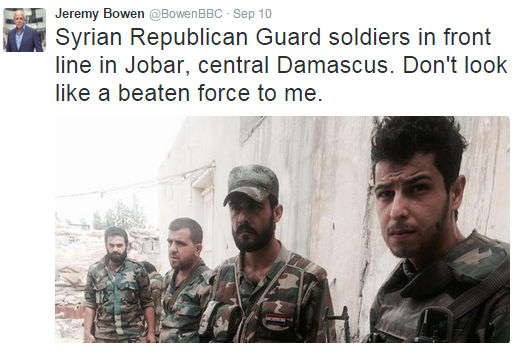
Latakia again featured in an audio report by Bowen broadcast on the BBC World Service radio programme ‘World Update: Daily Commute’ on September 9th (from 03:06 here). Bowen described idyllic beach scenes before interviewing people who are clearly regime supporters. He then reported again from the same military hospital, and listeners heard more pro-regime comment.
Also on September 9th, a written report by Bowen appeared on the BBC News website’s Middle East page under the title “Migrant crisis: How Middle East wars fuel the problem“. Once again Bowen inserted a context-free reference to Israel which is entirely irrelevant to the story he was supposedly telling.
“I walked through the ruins of Yarmouk, one of the most fiercely contested battlegrounds in Damascus, only a few miles from the centre of the city.
Yarmouk used to be a Palestinian refugee camp for families who had fled or been driven from their homes when Israel won its independence war in 1948.”
He later added:
“An unknown number of Palestinian civilians, in their thousands, are trapped there [Yarmouk] too.
UNRWA, the UN agency that looks after Palestinian refugees, has not been able visit them with relief supplies since March.”
Bowen neglected to tell readers that Yarmouk was reclassified by the UN in June.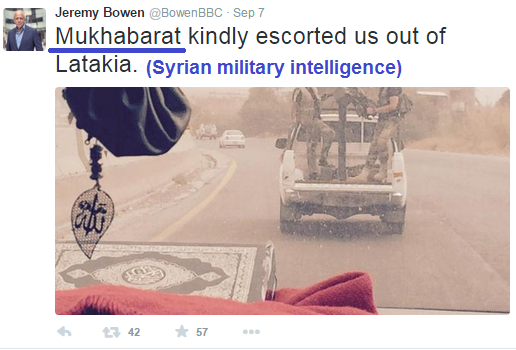
Yet again Bowen’s tepid and generalised portrayal of the issue of migrants fleeing the war in Syria did nothing to inform BBC audiences of the role played by the Assad regime and its Iranian and Hizballah backers in creating and exacerbating the migrant crisis.
In fact, all the reports produced by Bowen during his recent visit to Syria are little more than amplification of one very specific side of the story and they exclusively reflect the interests of the regime with which he was obviously embedded. It is therefore difficult to see how the BBC can claim that those reports contributed to providing its funding public with an accurate understanding of why so many Syrian civilians are leaving their country.



